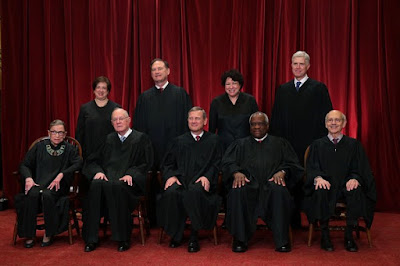Hidalgo's team is asking the court to strike down Arizona's death penalty and rule on the constitutionality of capital punishment nationwide.
45 years ago, a case came before the United States Supreme Court that led to the temporary strike down of the death penalty. Now, the court has the opportunity to take up another case that could transform - or even end - the death penalty in America.
In 1972, a black man named William Henry Furman was caught, mid-burglary, by a homeowner in Georgia. Furman attempted to flee and in doing so tripped and fell, causing the gun he was carrying to fire and kill the resident. Furman v. Georgia asked the Supreme Court if the imposition (and carrying out) of the death penalty in Furman's case constituted cruel and unusual punishment, in violation of the 8th and 14th Amendments. The answer, in a 5-4 decision, was yes.
Justices William Douglas, Potter Stewart and Byron White came to the conclusion that entrenched racial biases caused an unacceptable level of arbitrariness in deciding who would receive the death penalty. Justices Thurgood Marshall and William Brennan went a step further, coming to the shared conclusion that the death penalty in and of itself was cruel and unusual punishment and utterly incompatible with the evolving standards of decency of a civilized society. Justice Powell, in his opinion, famously wrote that the death penalty was imposed on a "capriciously selected random handful" and was "cruel and unusual in the same way that being struck by lightning is cruel and unusual." Furman v. Georgia resulted in a 4-year-long moratorium on executions in the U.S., and each person on death row had their death sentence commuted to life in prison. A number of columnists across the country seemed to be in agreement that it was unlikely that the death penalty would ever exist again in the United States. Unfortunately, they were wrong.
In the wake of Furman, a number of states moved to entirely re-write their death penalty statutes in an attempt to prove that their systems for imposing the death penalty weren't arbitrary. Ideally, this would have meant narrowing the imposition of capital punishment to the very worst crimes. What happened instead, somewhat ironically, was the number of crimes that are death-penalty eligible ballooning in number. In 1976, in Gregg v. Georgia, the Supreme Court reinstated the death penalty by approving several states' new laws.
Many states have continued to add more and more aggravating factors that render someone eligible for the death penalty, including murder for hire and aggravated kidnapping. In 2015, Kelly Gissendaner was executed in Georgia for orchestrating the killing of her husband, even though she herself did not commit the murder.
In Arizona, the legislature has more than doubled its number of aggravating factors since the 1970s. When Abel Daniel Hidalgo was sentenced to death for 1st-degree murder in 2015, the state had approved so many aggravating circumstances that nearly everyone convicted of 1st-degree murder was now eligible for death. Hidalgo also produced evidence that showed that several neighboring Arizona counties were unable to pursue a death sentence in cases far more egregious than his due to simple budget constraints.

In early 2017, Neal Katyal, the former Solicitor General under Obama (most recently famed for his work as the lead attorney for Hawaii's challenge of President Trump's travel ban) agreed to represent Hidalgo's case before the Supreme Court. Hidalgo's team is asking the court to strike down Arizona's death penalty and rule on the constitutionality of capital punishment nationwide. The administration of the death penalty in 2017, they argue, is in clear violation of the 8th Amendment, which holds that capital punishment must be reserved for only the worst offenders. Arizona's current capital sentencing statute, which allows for 99 % of 1st-degree murders to be death-eligible, does not meaningfully narrow the class of offenders eligible to be executed to "the worst of the worst."
There were approximately 17,250 murders in the United States last year. There were 30 new death sentences imposed. Were these handed down in response to the most egregious crimes to the most irredeemable people? No. Their race, their socioeconomic status, their geographical location, and the quality of their lawyers - both defense and prosecutor - ultimately played the most decisive roles in which of them received a death sentence. Statistics tell us that it's likely that 1 in 25 of those new death sentences was handed down to a person who was completely innocent of the crime. There are clear patterns of race of victim, or race of defendant, discrimination in courts across the country. A total of 20 white people have been executed for the murder of a black person, while 287 black people have been executed for the murder of a white person. 94.5 % of prosecutors in death penalty states are white.
It is time to accept that the death penalty experiment in the United States has failed. The tangled web of racism, classism and human error has proven time and again to be ineradicable in the administration of the ultimate punishment. If the Supreme Court decides to hear Hidalgo v. Arizona, there is a very real possibility that executions in the United States will end. As they should.
Source: Huffington Post, Hannah Riley, November 10, 2017. Hannah Riley, Contributor, Criminal Justice Reform & Anti-Death Penalty Advocate.
⚑ | Report an error, an omission, a typo; suggest a story or a new angle to an existing story; submit a piece, a comment; recommend a resource; contact the webmaster, contact us:
deathpenaltynews@gmail.com.
Opposed to Capital Punishment? Help us keep this blog up and running! DONATE!
"One is absolutely sickened, not by the crimes that the wicked have committed,
but by the punishments that the good have inflicted." -- Oscar Wilde













